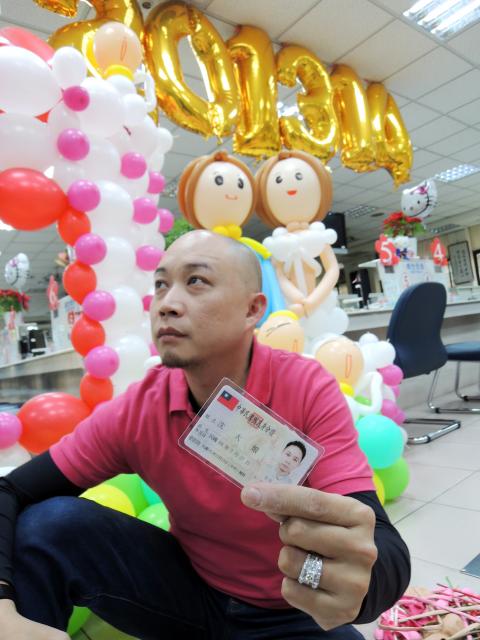The Ministry of the Interior released statistics on Jan. 24 regarding replacement applications for new national ID cards, which it started compiling on Dec. 21, 2005, when a universal replacement of national ID cards occurred, until the end of last year. Over the course of 7 years, a total of 2,942,170 IDs were replaced. One Taipei resident in particular, nominally the nation’s “King of ID replacement,” applied for a new ID 40 times — an average of 6 times per year.
Hsieh Ai-ling, director of the ministry’s Department of Household Registration, says that according to the law, a person is eligible to replace a national ID card if it is lost, damaged or stolen, the first reason being the most common. The reasons for damaged or stolen IDs can include a person’s ID being stolen along with their wallet, an ID being damaged in a fire, or someone dropping it into a river and not being able to retrieve it.
Have there been any concerns whether the person who applied to replace his ID 40 times was a criminal? Is it against the law for household registration agencies to do background checks through police stations or financial institutions? Hsieh says that they do mark an individual as being worth monitoring if they apply an exorbitant number of times.

Photo: Tsai Shu-yuan, Liberty Times
照片:自由時報記者蔡淑媛
The statistics show that only two individuals have applied for ID replacements more than 30 times, one in Taipei and the other in New Taipei City, while a total of 15 have people applied more than 20 times, with three each in Taipei, New Taipei City, Greater Taichung, and Taoyuan County, and one each in Greater Kaohsiung, Hualien County and Hsinchu City.
After splitting up the numbers according to municipality and county, the city with the highest number of ID replacement applications was New Taipei City (523,732), followed by Taipei (361,509) and Greater Kaohsiung (349,285), respectively.
Deputy Minister of the Interior Chien Tai-lang says that since the Personal Information Protection Act went into effect on Oct. 1 last year, people in both the public and private sectors have been more concerned about protecting their personal information than before. In order to protect people from identity theft, the ministry added a 24-hour service system to its 1996 Hotline of Interior Affairs for reporting lost national ID cards, which can also be used in the same way when an ID is recovered.
(Liberty Times, Translated by Kyle Jeffcoat)
內政部一月二十四日公布「新式國民身分證補證統計表」,自二00五年十二月廿一日對國人全面換發新式身分證到去年底為止,共七年來累計換證二百九十四萬二千一百七十張,有一台北市民申請補證逾四十次,換算每年近六次,是獨步全國的「補證王」。
內政部戶政司長謝愛齡說,法定補證原因包括遺失、滅失,民眾申請補證的理由以前者居多,後者的型態包括身分證放在皮包內一併遭竊、火警事故中燒毀、掉入河海無法拾回等。
對於七年補證次數多達四十次的民眾,其背後是否有犯罪疑慮?戶政單位是否與警察機關、金融機構連線查察不法?謝愛齡說,補證頻率異乎尋常者,「我們是有處理的作為」,將其列為注意對象。
統計也顯示,補證卅次以上的有兩人,在台北市、新北市各有一人;補證廿次以上的有十五人,台北市、新北市、台中市、桃園縣各三人,高雄市、花蓮縣、新竹市各一人。
若以縣市區分,補證人次最多的前三名,依序為新北市五十二萬三千七百卅二人次,台北市卅六萬一千五百零九人次,高雄市卅四萬九千二百八十五人次。
內政部政務次長簡太郎表示,去年十月一日個人資料保護法施行後,官民各界更加重視個資保障,內政部為避免民眾一旦遺失身分證後遭盜用,於「一九九六內政服務熱線」新增「國民身分證電話掛失服務」,廿四小時均可辦理,若自行找回,也可循同樣程序撤銷掛失。
(自由時報記者陳璟民)

Bilingual Story is a fictionalized account. 雙語故事部分內容純屬虛構。 I stand by the Miluo River as dusk falls. The court betrayal is too much. I served Chu with loyalty. I forged alliances and fought corruption. But the whispers of jealous courtiers, the murmurs of treason, spoke louder. The king cast me out. The water looks calm. It promises peace. I step in. The river is cold against my legs. I hear shouts behind me — fishermen calling my name. I keep walking. The calls grow louder, but I do not turn around. The water rises to my chest. It pulls at me. I

In Taiwan, people can use a platform to rent a power washer for a weekend or share unused garage space for someone’s storage needs. These are examples of the sharing economy, a consumption model that has gained widespread adoption worldwide. This approach allows people to rent or share assets like cars, homes or even services, typically through online platforms. This innovative model poses a simple yet powerful question: why purchase infrequently used items when sharing is more practical? By making useful but idle resources accessible, the sharing economy turns them into sustainable opportunities. Internationally, platforms like Airbnb and Uber have popularized

A: Recently, I’ve been seeing mosquitoes flying around in front of my eyes. The doctor said it’s the “flying-mosquito disease.” B: Flying mosquitoes? What a strange name. A: They’re actually called “floaters” in English, meaning floating debris. When fibrous substances in the vitreous body inside the eyeballs increase, floaters can appear in the visual field. B: Oh my goodness. Can you get rid of them? A: According to ophthalmologist Horng Chi-ting’s research, taking the enzymes of certain fruits is likely to help reduce floaters. A: 我最近一直覺得眼前有蚊子飛來飛去,結果醫生說是「飛蚊症」。 B: 飛蚊症?好奇怪的病名。 A: 英文名稱叫「floaters」, 也就是漂浮物的意思。 因為眼球的玻璃體中纖維化物質增多,導致視野出現漂浮物。 B: 天啊!要怎麼把蚊子趕走? A:

Continued from yesterday(延續自昨日) https://www.taipeitimes.com/News/lang Many people may be familiar with flapjack octopuses thanks to Pearl, a charming character from the Pixar film Finding Nemo. However, her portrayal presents several scientific inaccuracies. In reality, flapjack octopuses are deep-sea creatures, which are unsuitable for the brightly lit shallow reef environment depicted in the film. Their primary defense mechanism relies on their reddish coloration, which would be ineffective in the well-lit shallows. Pearl’s famous line, “You guys made me ink,” is another fictional detail that is not consistent with the observed actions of real flapjack octopuses. As common as it is in many other octopus